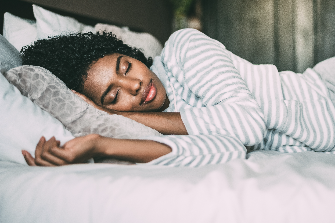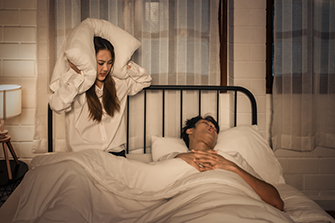3 Things to Do If Your Partner Snores
Does your partner’s loud snoring night after night drive you nuts? You are not alone. Having a partner who snores is very common; however, it shouldn’t be. Loud snoring night after night most likely indicates that your partner has sleep apnea, which is a dangerous condition that requires medical treatment. If you’re sick and (literally) tired of your partner’s snoring, we can help you. Keep reading for three things to do if your partner snores, including looking into alternative sleep apnea treatment methods that do not require a CPAP machine.
Don’t Shame Your Partner
We get it: Your partner’s snoring is annoying and prevents you from getting a good night’s sleep. You both might even be sleeping in separate spaces because of it, which could be causing issues in your marriage or partnership. However, it is important that when you talk to your partner about their snoring, you do not shame them for it.
Your partner likely has no idea that they snore, and bringing up their “bad habit” in an annoying, condescending, or frustrating way may only hurt their feelings and make it so they do not want to have the conversation with you. Instead, approach them in a loving way that lets them know you care about them and are concerned for their health.
Research Sleep Apnea and Present Facts
When speaking to your partner about their snoring, talk to them about what sleep apnea is and how it can raise their risk of some serious health complications. Sleep apnea does not go away on its own; it requires medical treatment to stop.
Central sleep apnea is caused by problems with the way your brain controls your breathing while you sleep. Obstructive sleep apnea is caused by conditions that block airflow through your upper airways during sleep. For example, your tongue may fall backward and block your airway.
Sleep apnea can raise your partner’s risk of the following health conditions:
- Asthma
- Cancers, such as pancreatic, renal, and skin cancers
- Chronic kidney disease
- Eye problems, such a glaucoma, dry eye, or an eye condition called keratoconus
- Heart and blood vessel diseases, such as atrial fibrillation, atherosclerosis, difficult-to-control high blood pressure, heart attacks, heart failure,
- pulmonary hypertension, and stroke
- Metabolic syndrome
- Pregnancy complications
- Type 2 diabetes
Look Into Alternative Sleep Apnea Treatment Methods
Unfortunately, one of the main reasons people do not get treatment for sleep apnea is that they do not want to be chained to a loud, bulky, annoying, and embarrassing CPAP machine. Luckily, there is another way to treat sleep apnea that does not require a lifetime CPAP machine sentence. This revolutionary treatment is called The Vivos Method.
Unlike nearly every other nonsurgical treatment for OSA, which requires nightly lifetime intervention, such as with a CPAP machine, studies show that patients undergoing treatment with our Vivos doctors have an average treatment time of about 12 months.
If you’re ready to help your partner move on from their dangerous, loud snoring, reach out to us. We’re here to help. Visit us at advancedsleepandTMJsolutions.com!







